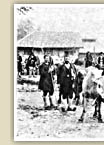
In the period of the great Balkan crisis between 1875 and 1878, when developments
demonstrated that Thessaly would be cut off from the Ottoman Empire, Zografos
and some of his colleagues bought land from the Ottoman Turk beneficiaries. This
was at a time when the Ottomans were still in power in that area, and when it was believed that the treaty by which the area was ceded
to Greece would include an obligation to respect property and property ownership.
The purchase was made at a relatively low price: 64,000 stremmata (one stremma = 0.10 hectares) cost
540,000 drachmas (27,000 liras of the time). He himself created the
chiftlik, thus uniting land he had purchased and in which approximately 400 families
were working and living.
However, the state of the peasants of the area deteriorated after the annexation of Thessaly
to Greece. This significant change can be seen in two internal regulations
of the Zografos chiftlik, the first one of 1877 and the second one of 1889. With the latter
all the favourable provisions included in the 'Ottoman Regulation of Agricultural Relations
of Thessaly' of 1861 were abolished, as they were not related to the modern Greek system. Each sharecropper was now to sign
an individual contract, renewable each year, and thus he was deprived of the
right to life-tenure and inheritance.
The owner could send the sharecropper away from the chiftlik whenever he wished,
by not reneweing his contract. The contract also obliged farmers to
acknowledge the proprietorship of Zografos over their houses and parts of the land
that had traditionally belonged to cultivators. Lastly, there were specific and very
strict provisions concerning the quantity of production that the sharecropper was obliged
to supply. Any peculiarities affecting cultivation such as weather conditions
were not included and generally speaking questions of responsibility and negligence the likelihood of a
bad harvest were not examined.
All these regulations did away with those laws and provisions under Ottoman rule that had attempted to protect cultivators.
However, the western-influenced 'Rule of the Law' that prevailed in Greece did not recognize
existing property and the institution of individual contracts
between landowners and cultivators.
Cultivators thus encountered new conditions, very different from those they had encountered previously. They became involved in contracts and transactions
the meaning of which they ignored and which they were unable to control. The most important change,
however, was that the status of their relation to the land they were cultivating
was changing. They were being transformed from tenants with specific rights
to tenants subject to the will of the owner. This situation led to the insuperable
entanglements of the Thessalian agricultural question and the revolts
of the early twentieth century, which were only resolved with the agricultural reforms of 1917.
|
 |
